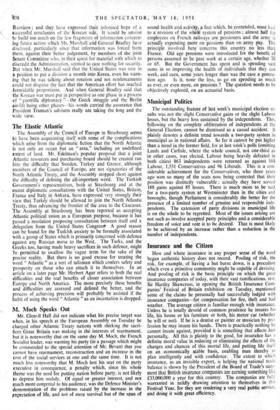Municipal Politics
The outstanding feature of last week's municipal election re- sults was not the slight Conservative gains or the slight Labour losses, but the heavy loss sustained by the independents. This, following on the complete obliteration of independents at the General Election, cannot be dismissed as a casual accident. It plainly denotes a definite trend towards a two-party system in municipal as in national affairs. So far it cannot be put higher than a trend in the former field, for at last week's polls (omitting Leeds and Carlisle, where the whole council, not one-third as in other cases, was elected, Labour being heavily defeated in both cities) 863 independents were returned as against 884 Labour, 1,531 Conservatives and 96 Liberals. This is a con- siderable achievement for the Conservatives, who three years ago won so many of the seats now being contested that their position was distinctly vulnerable ; actually they have scored 188 gains against 85 losses. There is much more to be said for a two-party system at Westminster than in the cities and boroughs, though Parliament is considerably the better for the presence of a limited number of genuine and responsible inde- pendents. The extension of party divisions in municipal life is on the whole to be regretted. Most of the issues arising are not such as involve accepted party principles and-a considerable freedom of voice and vote is to be desired. That is most likely to be achieved by an increase rather than a reduction in the number of independents.






































 Previous page
Previous page